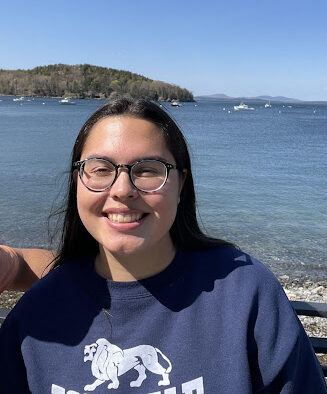Blog post by Hailee Nance
Lily Crigler is an undergraduate history major who worked on the public history Undergraduate Research Experience last spring. We asked her a few questions about her time in the program, and here and 10 things you should know.
- The hours can be flexible. Lily says that before starting, “I wish I knew that the URE was almost entirely remote for in-person students because my biggest concern was balancing the URE with my other classes and work. However, the URE being remote allowed me to be more flexible with my other responsibilities.” She says her particular URE required nine hours a week.
- In-person work is available. Although for Lily the majority of her work was done remotely, she was able to travel to different locations and work in person, “As an in-person student, I had the opportunity to do some work at the Arizona Heritage Center where I was able to go through some of their donations and assess their relevance to the museum.”
- You can connect with faculty. One of the best features of the URE is that it allows students to work alongside faculty and connect professionally beyond the classroom. Lily says, “It was very rewarding to work with a scholar (Erin Craft) as her mentorship has allowed me to gain many skills during the URE and has allowed me to have a personal connection with faculty members.” Forming connections with faculty and scholars is crucial for letters of recommendation, finding job opportunities and receiving great advice.
- No research experience is required. The URE requires no previous research experience. As undergraduates, it is very difficult to find opportunities to participate in college-level research alongside faculty. This is a great way to get started with research early in your academic career.
- Applying does not need to be scary. Faculty will understand that you are new to research and they want you to succeed. Lily says that she “was somewhat intimidated to apply since I had no experience…My first day was very relieving as my supervisor and fellow URE members were all kind, and I understood that the URE was very flexible with my class and work schedule”.
- You’ll learn a lot about your topic(s). Lily’s responsibilities were mainly digital curatorial work for A Journal of the Plague Year: An Archive of Covid-19, as well as transcribing oral histories. She says “Oral histories are important in understanding an individual’s personal experience with a certain topic, and by listening to many of them, I have heard a variety of perspectives on many different topics.”
- You’ll gain new valuable skills. Each research project is varied and will require different tasks, and participants learn a variety of new skills. For Lily’s assignments, she gained skills in digital curation, transcription work, research and communication in a remote/online setting.
- You’ll be trusted with important tasks. The idea of working on research may be daunting, but you will learn everything you need to. Lily says, “At first I was somewhat nervous about the amount of responsibility I was given overall since I was scared to accidentally delete or mess something up on the JOTPY website, but after practicing and learning along the way, it was rewarding to know that I was trusted with completing the various tasks that I was assigned with.”
- There will be great things ahead. Participating in research can help you narrow down your interests and gain valuable experience and skills that can lead to future work. After the spring program, Lily says that “Over the summer, I did remote work and continued working on JOTPY and other tasks from my URE but also did some work for newer projects. I am also still working in this position as a Public History Research Aide and am enjoying it very much and am glad that I have had the opportunity to continue this work!”
- The deadline is October 10th! Applications for the Undergraduate Research Experience for the spring semester are due October 20th and can be found here.

Lily Criglers final words of wisdom are, “My advice to anyone thinking of applying to the URE would be to take the risk of applying, especially if you think you are not qualified and don’t have the necessary experience. I almost didn’t apply because I had no experience, but I went ahead and applied and ended up getting the position which allowed me to gain the valuable skills and experience that I have now! Also, the time commitment may also be intimidating to those thinking of applying, but my URE was very flexible around my school and work schedule and the faculty was very accommodating as well.”

